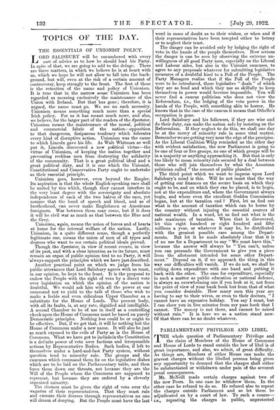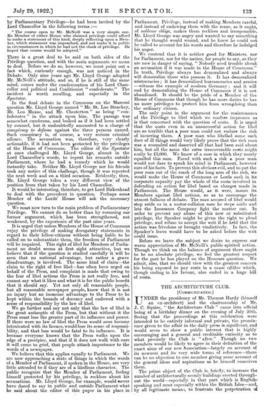PARLIAMENTARY PRIVILEGE AND LIBEL. T HE whole question of Parliamentary Privilege
and the claim of Members of the House of Commons and House of Lords to stand outside the law of libel is of great importance, and also, we admit, of great difficulty. As things are, Members of either House can make the gravest charges without the libelled persons being given any opportunity to demand that the charges Khali either be substantiated or withdrawn under pain of the severest penal consequences. Mr. McNeill made certain charges against two of the new Peers. In one case he withdrew them. In the other case he refused to do so. He refused also to repeat the charges outside Parliament and so let them be adjudicated on by a court of law. To such a course- i.e., repeating the charges in public, unprotected by Parliamentary Privilege—he had been invited by the Lord Chancellor in the following terms :— " The course open to Mr. McNeill was a very simple one. No Member of either House who claimed privilege could afford to make a statement of this kind, deeply reflecting upon a Mem- ber, which statement was impeached, and not make it in public in circumstances in which he had not-the cloak of privilege. He hoped that course would be adopted."
There is a great deal to be said on both sides of the Privilege question, and with the main arguments we mean to deal. Before we do so, however, we must point out a fact which; curiously enough, was not noticed in the Debate. Only nine years ago Mr. Lloyd George adopted Mr. McNeill's attitude, and so, if he is still of the same mind, comes under the condemnation of his Lord Chan- cellor and political and Coalitionist " confederate." The incident is worth recalling, and especially in the Spectator. In the final debate in the Commons on the Marconi question Mr. Lloyd George named " Mr. St. Loe Strachey, Mr. Leo Maxse, and Mr. Chesterton " as being " con- federates " in the attack upon him. The passage was somewhat cumbrous, and looked as if it had been settled by counsel, but it undoubtedly amounted to a charge of conspiracy to defame against the three persons named. Such conspiracy is, of course, a very serious criminal offence. The accusation was, therefore, very clearly actionable, if it had not been protected by the privileges of the House of Commons. The editor of the Spectator at once challenged Mr. Lloyd George, almost in the Lord Chancellor's words, to repeat his remarks outside Parliament, where he had a remedy which he would instantly take. Neither Mr. Lloyd George nor his friends took any notice of this challenge, though it was repeated the next week and on a third occasion. Evidently, then, Mr. Lloyd George takes a very different view of the position from that taken by his Lord Chancellor.
It would be interesting, therefore, to get Lord Birkenhead to deal with the precedent in question. Perhaps some Member of the Lords' House will ask the necessary question.
We must now turn to the main problem of Parliamentary Privilege. We cannot do so better than by resuming our former argument, which has been strengthened, not weakened, by the experience of the past nine years.
It is urged that unless Members of the House of Commons enjoy the privilege of making derogatory statements in regard to their fellow-citizens without being liable to be called on to substantiate them, the freedom of Parliament will be impaired. This right of libel for Members of Parlia- ment no doubt seems at first sight attractive, but we believe that if the question is studied carefully it -will be seen that no national advantage, but rather a grave disadvantage, is involved. The same kind of claim—the claim to the right of free libel—has often been urged on behalf of the Press, and complaint is made that owing to the fear of libel actions the Press is not really free, and cannot say what it likes and what it is for the public benefit that it should say. Yet not only all reasonable people, but all reasonable newspaper people, know that it is not an injury but an immense advantage to the Press to be kept within the bounds of decency and endowed with a sense of responsibility by the law of libel. We go further and say not only-that the law of libel is the great antiseptic of the Press, but that without it the Press must lose the greater part of its influence and power. If there were no law of libel the Press would soon become intoxicated with its licence, would lose its sense of responsi- bility, and that loss would be fatal to its influence. It is because everyone knows that the Press walks upon the edge of a precipice, and that if it does not walk with care it will come to grief, that people attach importance to the words of a newspaper. We believe that this applies equally to Parliament. We are now approaching a state of things in which the words of a Member of Parliament, if spoken in the House, are very little attended to if they are of a libellous character. The public recognize that the Member of Parliament, feeling himself protected by his privilege, is reckless about his accusations. Mr. Lloyd George, for example, would .never have dared to say in public and outside Parliament what he said about the editor of this paper in his place in Parliament. Privilege, instead of making Members careful, and instead of endowing them with the sense, as it ought, of noblesse oblige, makes them reckless and irresponsible. Mr. Lloyd George was angry and wanted to say something that he thought would wound, and he knew he could not be called to account for his words and therefore he indulged his anger.
We contend that it is neither good for Ministers, nor for Parliament, nor for the nation, for people to say, as they are now in danger of saying, " Nobody need trouble about- an accusation if it was made in the House of Commons." In truth, Privilege always has demoralized and always will demoralize those who possess it. It has demoralized aristocracies ; it has demoralized bureaucracies and armies —witness the example of modern Germany ; and it will end by demoralizing the House of Commons if it is not abandoned. It should be the pride of a Member of the House of Commons that though he has more duties he has no more privileges to protect him from wrongdoing than the ordinary citizen.
The only point in the argument for the maintenance of the Privilege to libel which we confess impresses us is that concerned with the question of costs. It is urged that the costs even in an unsuccessful action for libel are so terrible that a poor man could not endure the risk of incurring them. A poor man who libelled some such doer of ill things would very likely prove that the rich man was a scoundrel and deserved all that had been said about him, but all the same the extra irrecoverable costs might easily be £3,000. We know of a case in which they nearly equalled this sum. Faced with such a risk a poor man would not dare to speak his mind in Parliament, however sure of his facts. To prevent this obvious evil, and to put the poor man out of the reach of the long arm of the rich, we would make the House of Commons or Lords each in its corporate capacity pay the whole of the costs involved in defending an action for libel based on charges made in Parliament. The House would, as it were, insure its Members against libel actions, so as to encourage the utmost fullness of debate. The man accused of libel would step aside as in a motor-collision case he steps aside and lets the Insurance Company fight the matter out. In order to prevent any abuse of this new or substituted privilege, the Speaker might be given the right to plead privilege, and refuse to accept the writ if he held that the action was frivolous or brought vindictively. In fact, the Speaker's leave would have to be asked before the writ could issue.
Before we leave the subject we desire to express our warm appreciation of Mr. McNeill's public-spirited action. Though we think on the balance of argument there ought to be no absolute privilege, we feel the greatest respect for the part he has played on the Honours question. We admit, also, that we should view with the greatest concern his being exposed to pay costs in a cause cilibre which, though ending in his favour, also ended in a huge bill of costs.



































 Previous page
Previous page